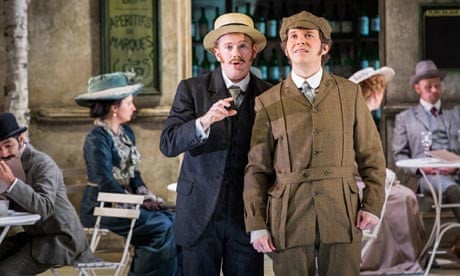The name André Messager may not be familiar today, but he was a major force in French music around the turn of the 20th century. An admired conductor of both Wagner and contemporary works – he led the premiere of Pelléas et Mélisande, which Debussy dedicated to him – he also wrote a clutch of operas, ballets, operettas and musical comedies. The 1907 "comédie lyrique" Fortunio, which Grange Park Opera presents in an astutely judged production by Daniel Slater, is sentimental and knowing at the same time.
Based on a play by Alfred de Musset, it describes how a village lawyer's wife, Jacqueline, who is conducting an affair with the bumptious army officer Clavaroche, is persuaded by him to use a decoy to distract attention from their relationship. They discover him in the person of Fortunio – the naive young clerk in her husband's office whose innocence prevents him being taken seriously. But Fortunio falls in love with Jacqueline, and eventually replaces Clavaroche in her affections.
Messager sets this half-tender, half-cynical tale with music of operetta lightness and operatic depth; if there are momentary recollections of his friend Debussy in Messager's harmonies, and in the understatement of his dialogue, that doesn't prevent him from being deliciously funny. Conductor Toby Purser highlights the score's entrancing subtleties while keeping the pacing brisk. The piece is revealed as a gem, whose moral ambivalence Slater and his designer Francis O'Connor also capture perfectly.
Tenor Alex Vearey-Roberts occasionally struggles with Fortunio's vocal line, but his wide-eyed ingénu manner is genuinely touching. Ilona Domnich's silver-tongued soprano allows her to get away with her multiple duplicities. Timothy Dawkins attracts more laughs than sympathy as her deceived husband, while Quirijn de Lang struts handsomely as the military bounder who finally gets his marching orders.

Comments (…)
Sign in or create your Guardian account to join the discussion